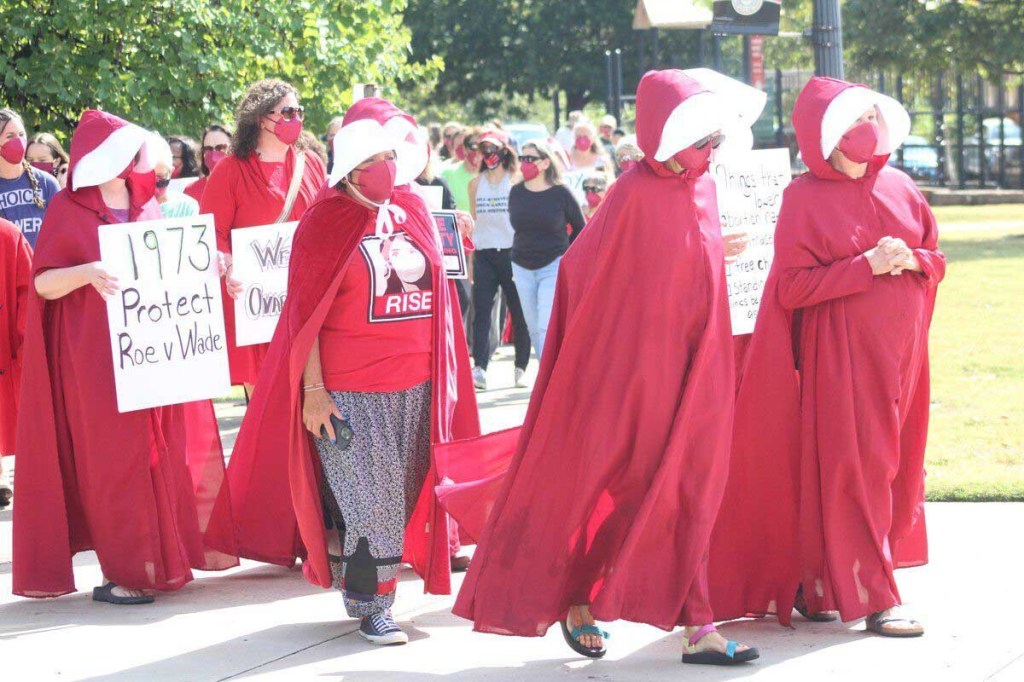Northeast Oklahoma group silently protests Texas law as regressive, harbinger of restrictions to come
Published 3:00 pm Sunday, October 10, 2021

- Grant D. Crawford | Daily PressAt Norris Park Saturday, the Tahlequah Women’s March Against the Madness group protested new laws banning abortions after six weeks of pregnancy.
TAHLEQUAH, Oklahoma – A group of Northeastern Oklahoma residents gathered Oct. 2 in a public park to protest a Texas law banning abortions after six weeks of pregnancy and allowing citizens to sue providers and anyone else who helps a woman obtain an abortion.
Dressed in clothing from “The Handmaid’s Tale,” a best-selling novel and TV series wherein a fundamentalist regime treats women as property of the state, the women protesters stood silently for 30 minutes. They and male advocates held signs calling for pro-choice rights – guaranteed under Roe v. Wade – to remain protected. They joined hundreds of thousands of other women across the country in similar demonstrations.
The Tahlequah Women’s March Against the Madness group adamantly denounced the new Texas law and voiced frustration over what they believe could be a harbinger of things to come.
“This is a law that isn’t about abortion; it’s about power and control over women’s bodies and access to safe, legal health care for women,” said Pam Moore, one of the group’s organizers and founding executive director of Help In Crisis. “As we stand here right now, [men] have more civil rights than I do.”
The heartbeat bill prohibits abortions after cardiac activity is detected, which is often before most women even know they’re pregnant, at around six weeks. Oklahoma Gov. Kevin Stitt signed what is essentially the same bill into law Sept. 9, with the ban on abortions once a fetal heartbeat is detected to take effect Nov. 1.
The protesters argued such efforts by governments limit personal rights, are invasions of privacy, and amount to “systemic madness.” The longtime debate and ongoing controversy over abortions has spurred misconceptions about what proponents of each side stand for, the demonstrators said.
But Dr. Sara Nordholm Brown clarified how she and other participants feel on the topic.
“Pro-choice does not mean pro-abortion,” Brown said. “We need to allow people to make decisions for their own bodies. I’m sad, because this is not easy. These are not easy decisions for anyone.”
The clothing from “The Handmaid’s Tale” has been adopted by women throughout the world as a symbol of protest. In the book and TV series, due to a plummeting birth rate, the remaining fertile women are forced into sexual servitude in an attempt to repopulate the patriarchal society. The long red dresses are meant to represent reproductive organs, reflecting the women’s “role” in society.
“This is where we’re headed,” Moore said. “It’s called a theocracy, and if I’m not a Christian, then I must be a witch, and I’m not entitled to full protection under the law. Separation of church and state – there’s a reason for it. There is way more than just white Christians and white evangelicals in this country, and we are built on the ability to choose. That is quickly going away. We are not a Christian nation; we are a nation of people who are spiritual, with many different religions.”
On Wednesday, Oct. 6, a federal judge halted enforcement of the law at the behest of the U.S. Justice Department. But women’s advocates and providers have said they fear their victory will be short-lived, since Texas is determined to appeal the ruling.





